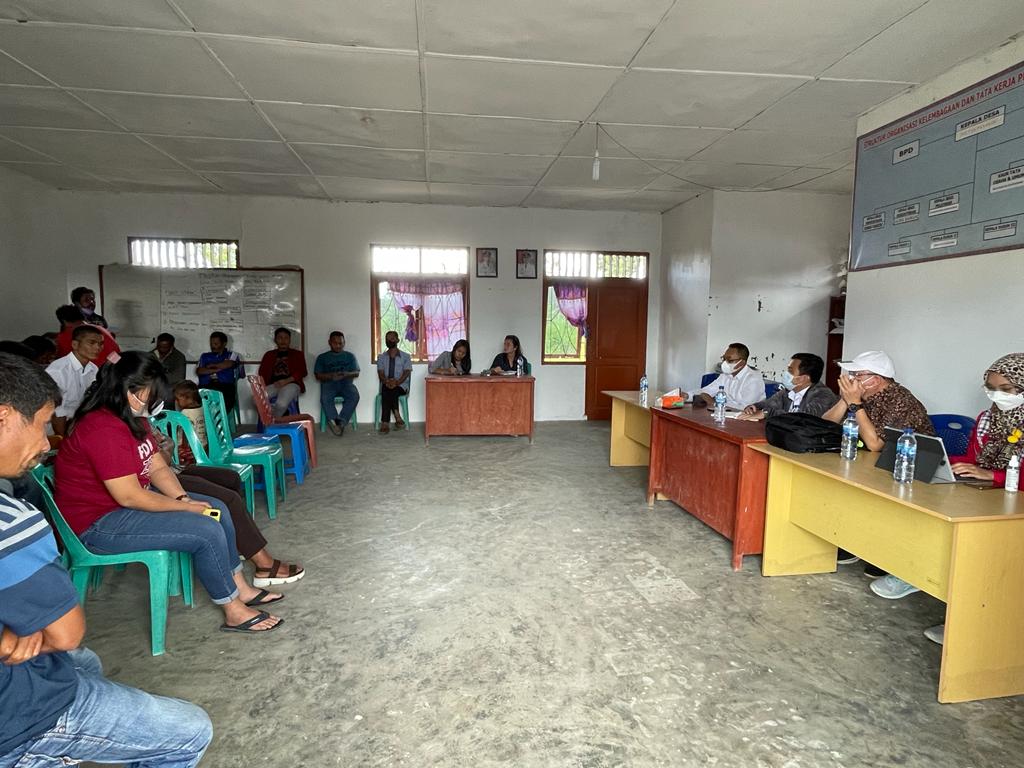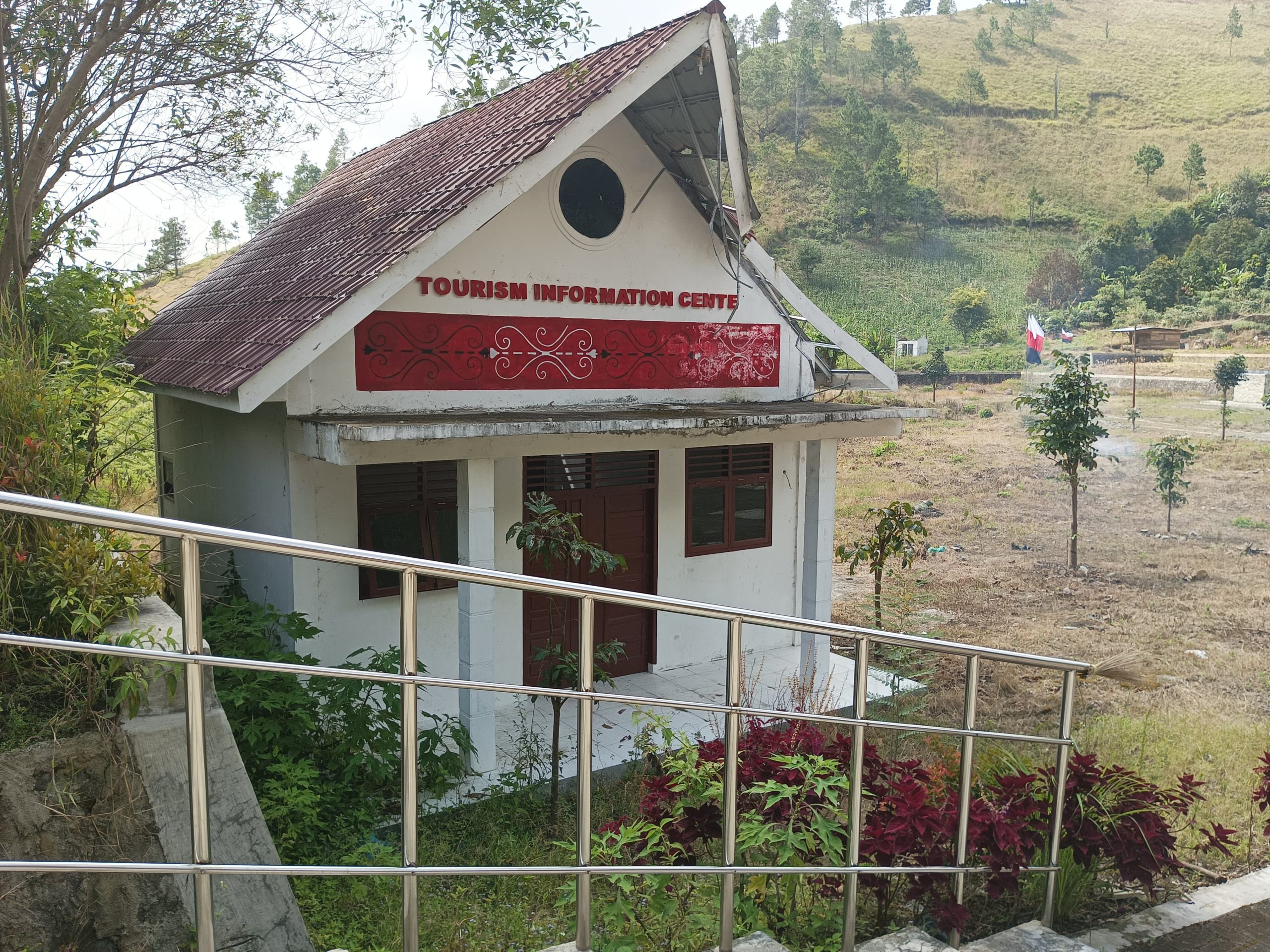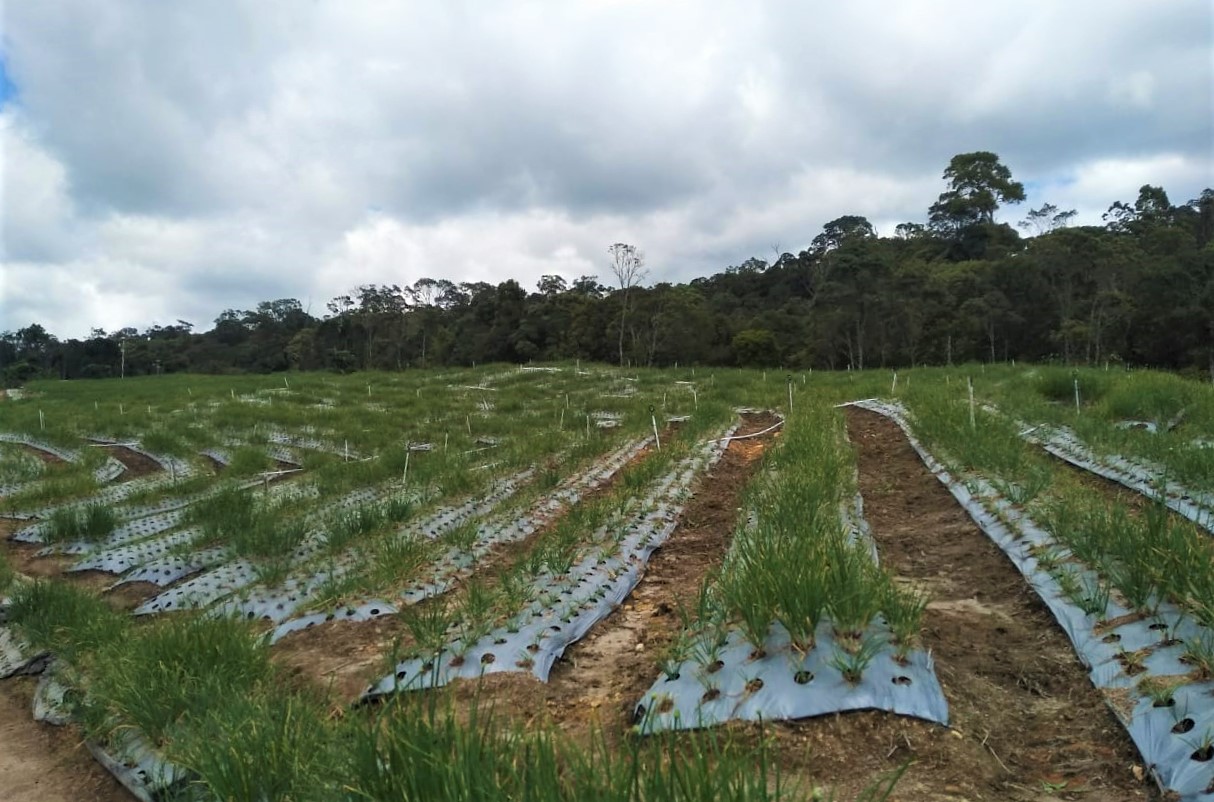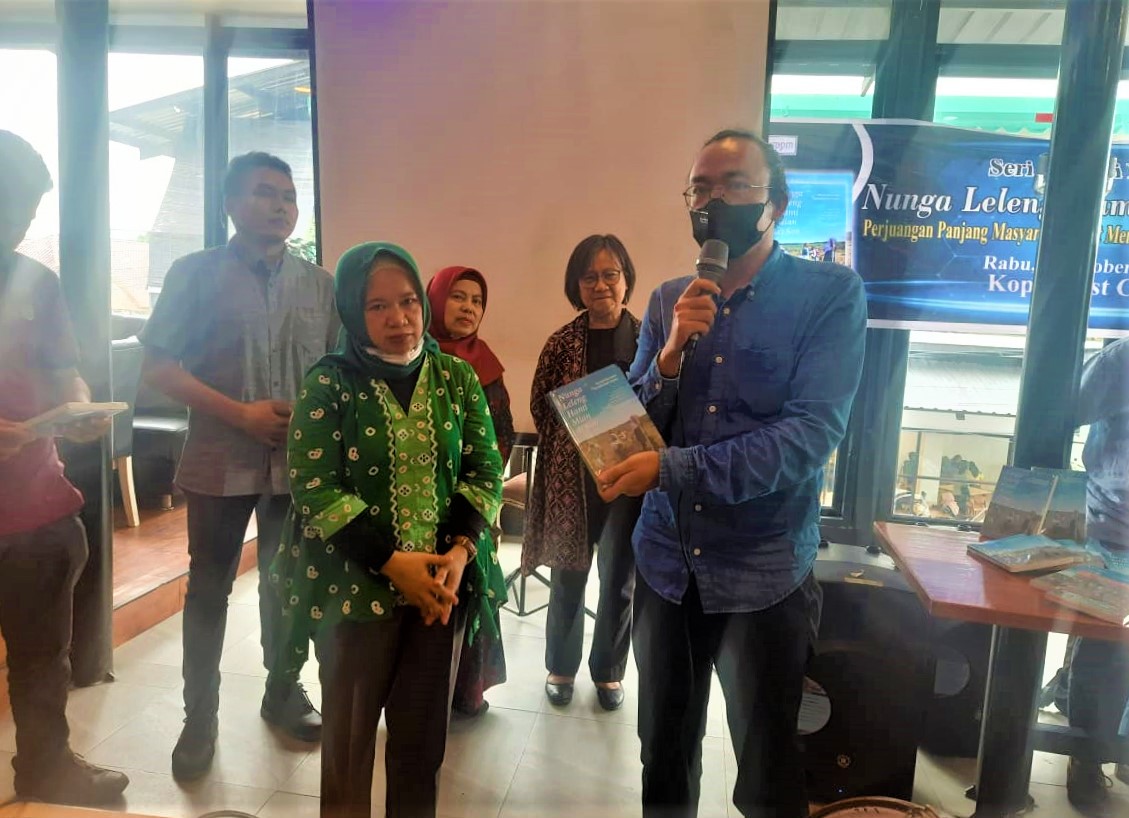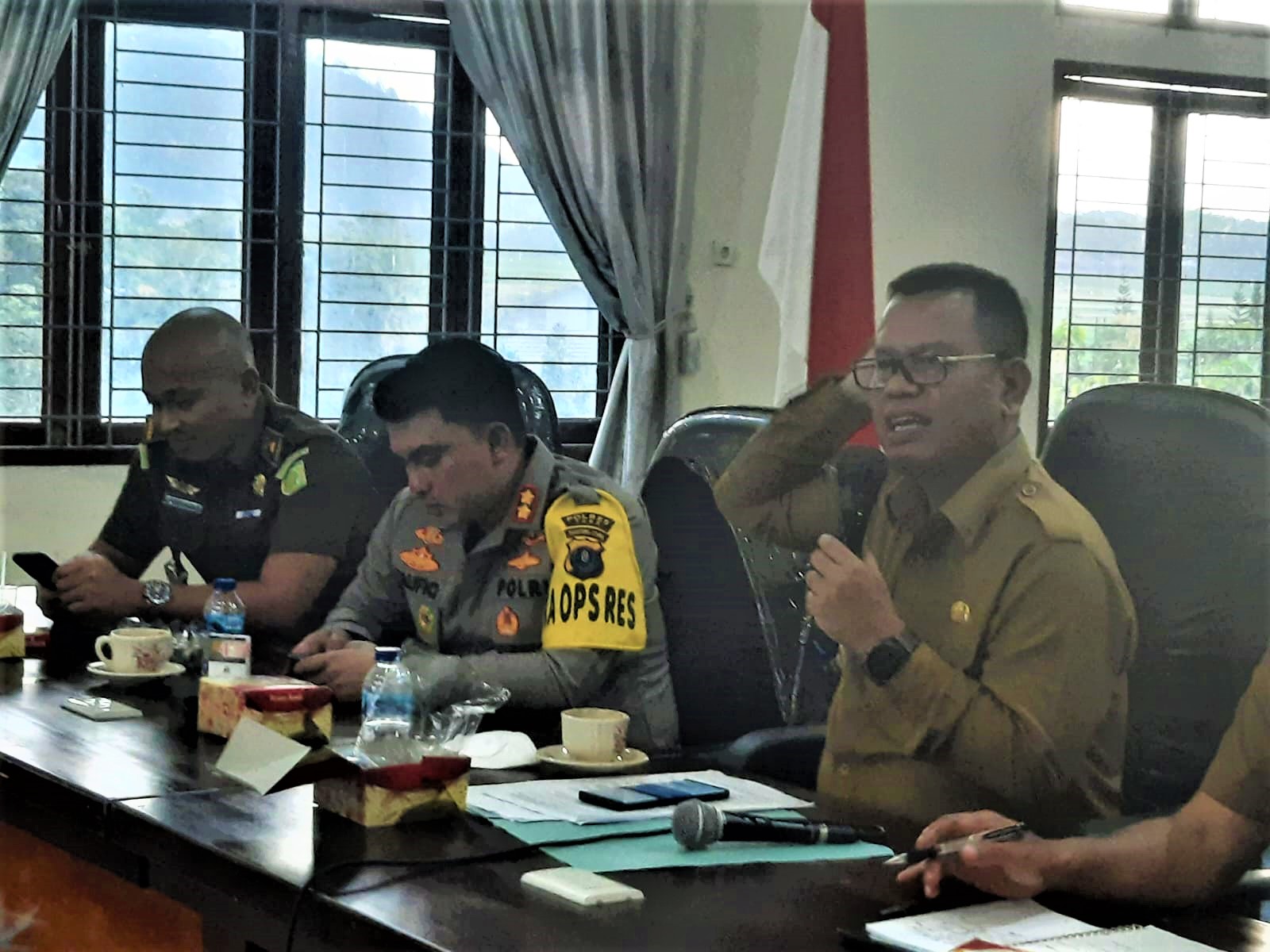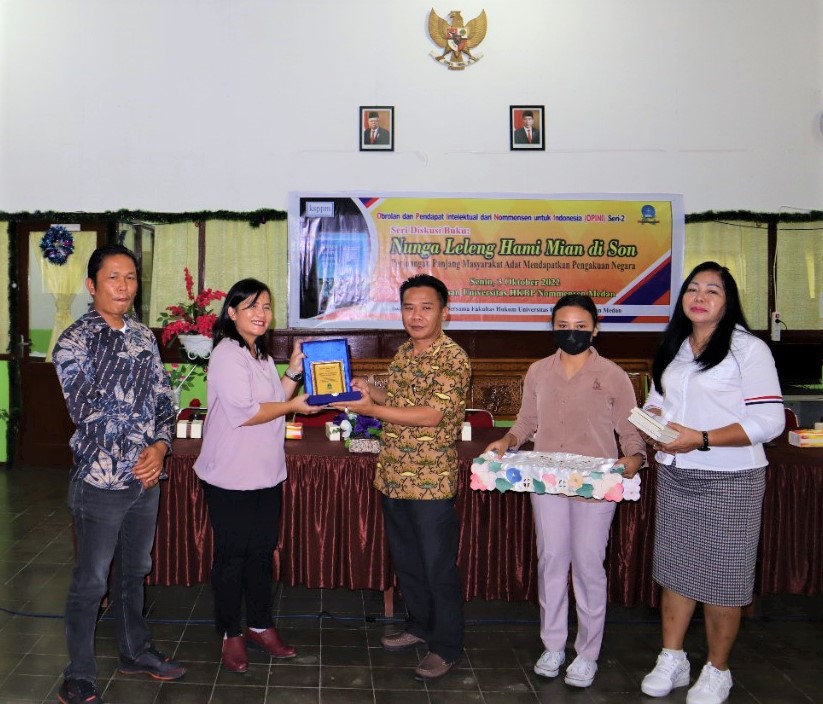“Every year we are taxed, but we do not receive our rights”, Pak Jono’s loud voice filled the meeting room of Janji Maria Village, Wednesday, 16 March 2021.
Pak Jono is a transmigrant family who has lived for about 18 years in Huta Janji Maria. On 26 December, he and four other families from Ciamis, West Java, left for Janji Maria. The five families joined the transmigration program after listening to socialization from the Ciamis Regency Government that there would be a transmigration program to North Sumatra. Pak Jono, who did not own land in West Jawab, was promised that he would be given residential and agricultural land of around 1.25 hectares per family. In addition, they were promised that they would be built a house, given a year’s living expenses and farming capital.
On 29 December 2004, Pak Jono and four other families from Ciamis arrived at Huta Janji Maria. They immediately occupied the transmigrant house that had been built by the Toba Samosir Regency Transmigration Office in 2003. The settlement area is about 0.25 hectares and the agricultural land area is 1 hectare. The first phase of transmigration is intended for 100 families. “For a year we were given a subsidy for life insurance (jadup), and agricultural capital”, said Pak Jono.
In addition to the five families from Ciamis, there are also 25 families of Aceh Tsunami victims and 70 local transmigration families. Previously, the Toba Samosir government promised transmigrants that within 1-5 years they would get land titles. Because the development promises were never fulfilled, four transmigrant families from Ciamis chose to return home to Ciamis. Meanwhile, Pak Jono decided to stay because, besides having no land in Ciamis, he felt very compatible with the local people there.
“I got along well with the people here, so I chose to be patient and wait for the government to fulfil its promises to the indigenous people and transmigrants,” Pak Jono told the National Commission on Human Rights team.
Development Promises Never Fulfilled
However, in the nearly twenty years they have lived there, promises have not been fulfilled. On the contrary, when they questioned the government at both the district and provincial levels about their rights, they were told that their data no longer existed. “We are not illegal transmigrants, we pay taxes too”, said Mr Jono.
Days passed, months passed, and years continued to grow, but the government’s promises were never fulfilled. Road infrastructure development to the sub-district capital, land titles, education and health facilities have not been improved. Their fate is increasingly in limbo. Not only transmigrant families, the indigenous people who survive there also feel lied to. Their hopes for their hamlet to open up and escape from backwardness with the transmigration programme have been dashed.
The placement of transmigration sites in their customary territory is not without purpose. Janji Maria Village used to be a hamlet of Pangururan Village. Their hamlet was very isolated from the sub-district capital. The hamlet is the customary territory of Op. Sunggu Barita Pasaribu. One by one, the descendants of OP. Sunggu Barita Pasaribu moved to another place that was more crowded. By 2002, there were only 16 families living there. They moved because of the poor road infrastructure from and to their village to other places, the distant traditional market, and the distant education and health facilities. Primary school children walked 9 kilometres to the kecataman capital. So it became common for their children to have to board in the sub-district capital or choose not to go to school if they wanted to enter primary school.
Not wanting to leave his ancestral land, Tumpan Pasaribu, the 12th descendant of Op. Sunggu Barita Pasaribu, and his 15 other siblings, chose to offer their hamlet as a transmigrant location. They thought that if they became transmigrant sites, development would take place in their hamlet. In 2022, they proposed their hamlet to be a transmigration site, and in 2003. The Toba Samosir Transmigration Office built a settlement and that year their hamlet officially became a transmigration site.
For Marojahan Sitanggang, a local transmigrant participant, their life at the Transmigrant Site is like living in prison, confined to a location with a myriad of limitations. Although there is a provincial road in their village, the road infrastructure is very poor. Access to education is also very limited. There are only two civil servant teachers who teach at an elementary school there, six more are honourary status. Access to health is even worse. Although there is a Village Polyclinic building, which for the size of their village is a luxury, according to Pak Marojahan, it is abandoned. They had a midwife until 2006. Since then there has never been a midwife, until 2020, when a volunteer midwife lived there. But only for three months, because the midwife passed away.
Indeed, right at the Village Hall there is an abandoned polindes building. The yard is filled with tall grass. It looks like it has not been functioning for a long time.
“I still remember two years ago, when my daughter was about to give birth, I had to take a bad road for about three hours to the nearest health centre in the sub-district. From the sub-district, it took another three hours to the referral hospital. My daughter risked her life travelling 5-6 hours to give birth safely. For us people in this village, we know that the process of giving birth cannot be delayed, cannot be arranged, but we cannot choose to give birth in our village, because there are no midwives. We can’t choose from good roads, because all the roads are bad”, Mr Marojahan told the Komnas HAM team who were monitoring their village about the severe problems they face.
TPL’s existence adds to the misery
Both transmigrant families and indigenous people who are there, feel cheated by government promises. For more than ten years they have resigned themselves to waiting, but the expected development has never happened. The problem became even more complicated when in 2018 they learnt that almost all indigenous territories and most transmigration sites are state forest areas. Not only that, it is also included in the concession of PT Toba Pulp Lestari (TPL). According to residents, there are around 16 hectares of transmigrant sites that are included in PT TPL’s concession, and managed by the pulp-producing company owned by Sukanto Tanoto. For the indigenous people, this is a form of land grabbing, because to their knowledge, from their ancestors, it is the customary territory of Op. Sunggu Barita Pasaribu.
They explained to Komnas HAM the impacts of the company’s presence on their lives so far. In addition to land grabbing, destroying the benzoin forest and replacing it with eucalyptus, the company also destroyed their source of drinking water. The source of drinking water for the entire family comes not only from rainwater, but also from the rivers in their customary territory. But the presence of eucalyptus plantations has damaged the rivers, leaving less water in the dry season and murky in the rainy season. They also said that the company planted eucalyptus plants on the banks of the river that they consume. Meanwhile, the company often sprays eucalyptus with toxic pesticides. Chemical fertilizers and pesticides seep into the rivers that are the source of their drinking water.
The accusations of the community do not seem to be exaggerated, when a team from Komnas HAM visited the water source, several empty bottles of poison and pesticides were found floating on the surface of the river. The drugs were pest repellent poisons allegedly used on eucalyptus. Eucalyptus plants surround their river water source. According to Mr Tumpan Pasaribu, the water used to be used as a fish pond, but since the company planted eucalyptus around it, no fish have lived and grown.
No Data on Transmigration
To obtain certainty regarding their status, the transmigration community in Janji Maria has repeatedly mailed letters and held hearings with the Toba Regency Transmigration Office and the National Land Agency. Hearings at the DPRD office by inviting various parties have also been held in 2021. Unfortunately, both the Toba Regency Transmigration Office and the BPN said that the data on transmigration was no longer available in their offices.
Not satisfied with the Toba Regency Transmigration Office’s answer, they went to report their fate to the Provincial BPN in December 2021. The BPN has come to the location but only took measurements. There has not been any good news regarding the results of their visit to their village.
The government instead asked the transmigration community for data. If the government itself, which should have good administrative governance, loses data, let alone transmigrant communities, who have to grapple with a myriad of problems in transmigration areas.
“The government should find a solution to our problem, not impose data loss on us, so that our fate continues to hang,” said Mr Jono.
According to Mr Hariansyah, Mediation Commissioner and Coordinator of the Subcommission on Human Rights Enforcement, the district government’s attitude is one of neglect. The government should find a solution and re-collect the data.
The Fate of Indigenous Peoples: Similar to the fate of transmigrants
The hope of the indigenous people of the descendants of OP. Sunggu Barita Pasaribu, to propose their customary territory as a transmigration location, in order to feel the sweet fruit of development, seems increasingly blurred. Development promises never appeared, then their territory was even used as a PT TPL concession.
They seem helpless in their own customary territory. So when eucalyptus plants began to encroach on their customary territory, there was a feeling of being unable to resist. Every inch of their land was taken to plant eucalyptus. Frankincense sap is declining year by year. Rivers are getting smaller and drinking water sources are being polluted. In addition, there is the removal of ancestral graves in the customary area due to eucalyptus planting.
“There are about six graves of our ancestors that were lost due to the planting of eucalyptus in our customary territory. The first planting was still protected by a fence made of wood, but in the next planting it was flattened to the ground and disappeared. The old graves were bulldozed in our absence. We fought back but were not responded to,” said Mr Tumpan Pasaribu.
“It’s not better, our lives are getting harder now, more isolated, even on our own land we are restricted from working”, said Haposan Sitanggang.
“I was imprisoned for nine months because I was accused of illegal logging. The land given to me by the government for transmigration contained trees. I cut them down to cultivate the land. But I was reported by TPL and I was jailed for nine months,” he said. At that time the community resigned themselves to being blamed even though they did not feel wrong, because what they did was clear the transmigration land given to them. “Because there was no one to assist us, we just accepted the punishment,” he added.
Until now, the company has often prohibited the community from carrying out activities in their fields, on the grounds that it is a concession area. On the other hand, the district government is increasingly indifferent to the fate of the transmigrants. “We fight alone with what is in this village, our agricultural products cannot be transported to the market because of poor transport, our lives remain poor”, said Mr Jono.
“We want to escape from this isolation, we want to be independent, get certainty and recognition on our land, we started fighting in 2019”, said Mr Marojahan Sitanggang.
Departing from the spirit of sovereignty in their own land, since 2019, the Janji Maria community has begun to make various advocacy efforts to release customary territories and transmigration sites from forest areas and TPL concessions. Together with KSPPM they submitted a request to the Minister of KLHK so that their customary territories were returned.
“The government, in this case KLHK, has begun to respond to our demands, the verification team has come to our village, and the result is that when Pak Jokowi came to Bakara, our Customary Forest Decree was given for 118 hectares. This area is not in accordance with our demands. From our participatory mapping, our customary area is around four thousand hectares, but in the decree that was handed over, our customary forest was only recognised as 118 hectares,” explained Mr Sitanggang.
According to Mr Sitangang, the decree is also not a definitive decree, but an indicative decree of customary areas, because the Toba Regency Government, in this case the Regent, does not want to sign the decree recognising and determining indigenous peoples in Toba. Although the Regional Regulation on the Recognition and Protection of Indigenous Peoples already exists, the regent seems unwilling to recognise the existence of indigenous peoples in Toba Regency.
For the indigenous people of Janji Maria, the regent’s attitude is very odd and unreasonable, where the KLHK itself has issued an indicative decree departing from the verification carried out by the verification team. But the Toba Regent, who should protect them, is reluctant to give recognition.
In the absence of a decree on the determination and recognition of indigenous peoples and customary territories from the Toba Regency Government to the Janji Maria Indigenous Community, the MoEF can only issue a decree on the determination of indicative areas of customary territories through Decree No. 7893/Menlhk-PSKL/PKTHA/PSL.1/12/2021 on the Determination of Indicative Areas of the Janji Maria Indigenous Forest within the Territory of the Pomparan Ompu Sunggu Barita Indigenous Community covering 118 (one hundred and eighteen) hectares in Janji Maria Village, Borbor District, Toba Regency, North Sumatra Province. Meanwhile, one of the requirements for the issuance of a Customary Forest Decree, in addition to the existence of a Regional Regulation on the Recognition and Protection of Indigenous Peoples, must also be accompanied by a Decree on the Determination of Indigenous Peoples and their customary areas.
Expectations of the Janji Maria Community to Komnas HAM
The monitoring conducted by the Komnas HAM team to Janji Maria on Wednesday, 16 March 2021 is expected to accelerate the fulfilment of rights that have been neglected so far.
“We know that your presence from the centre, precisely from Komnas HAM, is very appropriate in our village, because the problem of human rights violations that we are currently facing has been protracted for quite a long time. As an institution that handles human rights affairs, we entrust our problems to you so that the government can immediately follow up. Our rights are fulfilled, the government’s promises are kept. And how the Toba Regency Government wants to give us the designation of indigenous people. So that we are comfortable and safe working in our fields,” hoped Mr Marojahan Sitanggang.
In addition to discussions with the community in Janji Maria, the Komnas HAM Team also conducted field observations of the badly damaged provincial road, monitored customary areas that had been planted with eucalyptus, reviewed drinking water sources surrounded by eucalyptus plants and also visited old graves in the customary area.
The community hopes that the evidence presented to the Komnas HAM team and the team’s observations in the field will pave the way for the resolution of the conflict they have been experiencing. So that their rights as indigenous peoples and transmigrant communities are fulfilled by the state.***
(Delima Silalahi)

